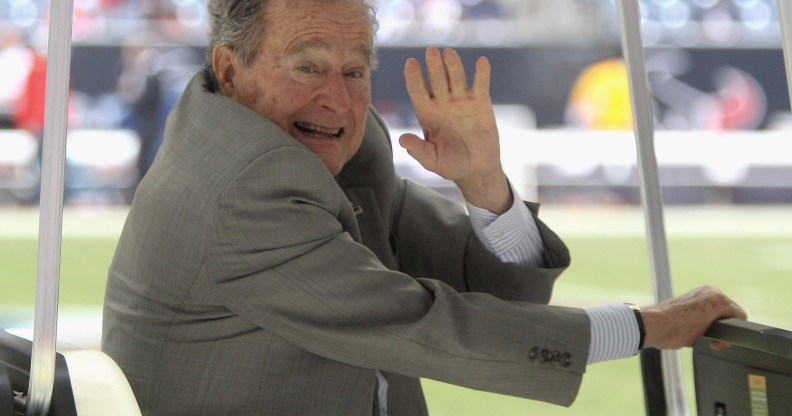George H.W. Bush opposed gay marriage, until he was a witness to one

Former President George H.W. Bush died on November 2018, aged 94. (Bob Levey/Getty Images)
Former President George H.W. Bush, has died on November 30, aged 94.
Bush served as the 41st President of the United States for one term, from 1989 to 1992 and leaves behind a mixed record on LGBT+ rights.
The Republican politician succeeded Ronald Reagan to the White House, after serving two terms as his vice-president at the time of the AIDS crisis in the US.
The Reagan administration was widely criticised for its prolonged silence and inaction on the crisis. Reagan would not mention the word “AIDS” in public until 1985—by then, more than 5,000 Americans had already died.
George H.W. Bush on AIDS crisis
As vice-president, Bush was publicly ridiculed at the 3rd International Conference on AIDS in Washington, DC for advocating mandatory HIV testing.
By the time Bush became the Republican party nominee in 1988, the President’s Commission on the HIV Epidemic advised the Reagan administration to protect people living with AIDS from discrimination—a plan Bush endorsed, but Reagan failed to enact during his presidency.
“I can’t accept as normal life style people of the same sex being parents.”
— George H.W. Bush (1992)
As stigma against people living with AIDS continued to increase, it was President Bush who eventually enacted anti-discrimination protections as part of the Americans with Disabilities Act he signed into law in 1990.
“Once disease strikes, we don’t blame those who are suffering . . . We try to love them and care for them and comfort them. We don’t fire them, we don’t evict them, we don’t cancel their insurance,” he said of the legislation, as The Washington Post reported at the time.

George H.W. Bush opposed gay marriage, but then he became the first president to be a witness at a same-sex wedding in 2013. (Patrick Smith/Getty)
Also in 1990, Bush signed the Hate Crime Statistics Act, the first federal legislation to recognise “sexual orientation” as a protected status.
The law required the Attorney General to collect data on crimes committed because of the victim’s race, religion, disability, sexual orientation, or ethnicity—but it also specified that “the American family life is the foundation of American Society” and “nothing in this Act shall be construed, nor shall any funds appropriated to carry out the purpose of the Act be used, to promote or encourage homosexuality.”
George H.W. Bush on same-sex unions
Bush never once mentioned the word “gay” in presidential remarks, according to a 2014 Human Rights Campaign (HRC) report.
While the issue of same-sex marriage was not a focus of LGBT+ activists at the time of Bush’s presidency, The New York Times reported that, gearing up for his 1988 campaign, Bush said in his audio diary that Americans “don’t want homosexual marriages codified.”
Towards the end of his presidency, Bush expressed harsher views on LGBT+ rights.
Challenged to the Republican nomination by former Reagan communications director Pat Buchanan, who had called AIDS “nature’s revenge on gay men,” Bush felt the pressure to adopt more conservative positions on civil rights, defending so-called “family values.”
“People have a right to be happy. I guess you could say I have mellowed.”
— George H.W. Bush (2015)
In a June 1992 interview with The New York Times ahead of that year November election that would see him lose against Democratic candidate Bill Clinton, Bush expressed opposition against same-sex parenting.
“I can’t accept as normal life style people of the same sex being parents. I’m very sorry. I don’t accept that as normal,” he said.
Two articles ahead of the 1992 election signalled LGBT+ voters change of attitudes towards Bush, who was initially seen as empathetic towards the community, but eventually lost their support: “Gays mobilizing for Clinton as rights become an issue,” read a headline in The Post in September 1992. “Gay politics goes mainstream,” titled The Times in October 1992.
Discussing his views towards same-sex unions in 2015, Bush recognised that his position “mellowed” over the years. “Personally, I still believe in traditional marriage,” he reportedly told his biographer Jon Meacham.
“But people should be able to do what they want to do, without discrimination. People have a right to be happy. I guess you could say I have mellowed,” he said.
Bush’s change in attitude was more visibly expressed in 2013, two years before the Supreme Court’s historic ruling on marriage equality.
He and his wife Barbara Bush—who died in April this year—attended their friends’ same-sex wedding in Maine, serving as two of the official witnesses.

